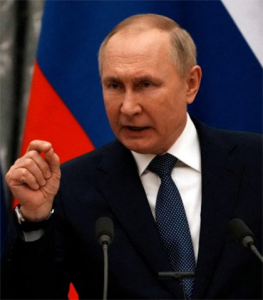Russian invasion of Ukraine would spark European refugee crisis
Europe could be plunged into a massive refugee crisis with millions of Ukrainians made homeless if Russia invades the former eastern-bloc nation, western nations have warned.
In the US, the Biden administration has said that a large-scale Russian invasion could kill as many as 50,000 civilians and prompt a refugee crisis in Europe.
 The US has warned that an invasion could create between one and five million refugees.
The US has warned that an invasion could create between one and five million refugees.
It has estimated that a full invasion would mean the potential deaths of 25,000 to 50,000 civilians, 5,000 to 25,000 members of the Ukrainian military and 3,000 to 10,000 members of the Russian military.
Neighbouring Poland is already preparing for a massive influx of refugees if Russia attacks Ukraine.
“We have to be prepared for the worst-case scenario and we have been taking steps so as to be prepared for a wave of up to a million people,” Poland’s Deputy Interior Minister Maciej Wąsik told local media.
The Polish government has pledged solidarity with Ukraine as tensions with Russia rise and said people fleeing the country in case of a Russian invasion would be “real refugees” and will receive help.
“In line with the Geneva Convention, these people will be under Polish protection, and we absolutely won’t say no to helping them,” Mr Wasik said.
Ukraine shares borders with EU members Poland, Romania, Slovakia and Hungary, but has the closest ties with Poland.
Recent reports say the Russian military has assembled 70 percent of the forces it would need to mount a full invasion of Ukraine. And six Russian amphibious landing ships sailed into the Black Sea this week.
US intelligence sources say they believed Russian President Vladimir Putin had not yet made a final decision to invade.
But satellite photographs and other intelligence showed he had assembled almost everything needed to launch what commentators are saying would be the largest military operation on land in Europe since 1945.
The intelligence sources say Russia is not likely to invade until the second half of February. By then, the ground will have frozen, making it easier to move heavy vehicles and equipment; and the Winter Olympics in Beijing will have ended or be winding down, which would avoid antagonising China – a critical Russian ally.
There are doubts about whether Poland has the capacity to deal with such a huge influx of refugees.
Last year, Belarusian leader Alexander Lukashenko sparked a political and humanitarian crisis in Poland by encouraging thousands of migrants from the Middle East to fly to Minsk and then make their way into the European Union.
Polish border guards pushed many people back into Belarus – with human rights groups saying that violated their right to claim asylum.
But observers says a Ukrainian crisis would be very different. Ukrainians have the right to visa-free entry into the EU and Ukraine borders the EU – meaning authorities won’t be able to claim that refugees should seek asylum elsewhere.
There are only 2,000 places to house refugees across ten centres run by Poland’s ‘Office for Foreigners’ — the government department responsible for migration.
Polish migration advocates say Poland will not be able to cope with a million refugees.
Already, there are more than a million Ukrainians in Poland who have sought better jobs, effectively becoming a part of Polish society.
But Poland’s nationalist government has rejected the notion that EU countries should share out asylum seekers – in the face of demands from frontline states like Greece and Italy during the 2016 migrant crisis.












